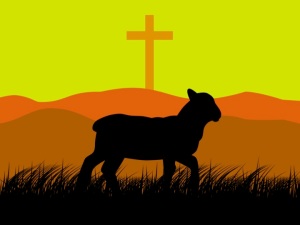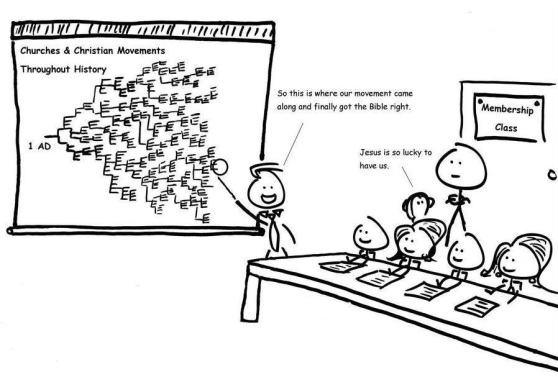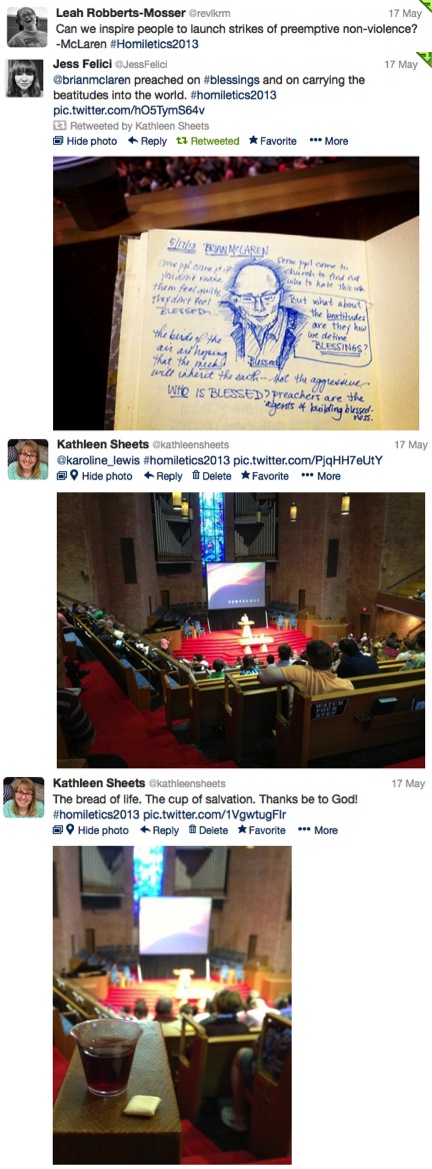“Table Grace”
Luke 17:11-19
October 2, 2016, First Presbyterian Church of Holt
 Unclean! Unclean! No, this isn’t about the new parent plight of struggling to take a shower, rather it’s what these 10 men in our story today were required to shout when they got near to anyone, lest they expose others to this terrible and infectious disease. Unclean! Unclean! Each shout creating a boundary, putting oneself at a distance.
Unclean! Unclean! No, this isn’t about the new parent plight of struggling to take a shower, rather it’s what these 10 men in our story today were required to shout when they got near to anyone, lest they expose others to this terrible and infectious disease. Unclean! Unclean! Each shout creating a boundary, putting oneself at a distance.
Often when I read the miracle stories I have trouble connecting them with our current reality. But this one?  It’s a scene of divisions: racial divides, religious separations, and health as a barrier to relationship. There’s nothing foreign about those concepts in our world today. We know what lines drawn in the sand do to our understanding of “us” and “them.” We know what fear is capable of when used as a weapon to divide and denigrate.
It’s a scene of divisions: racial divides, religious separations, and health as a barrier to relationship. There’s nothing foreign about those concepts in our world today. We know what lines drawn in the sand do to our understanding of “us” and “them.” We know what fear is capable of when used as a weapon to divide and denigrate.
 What is unfamiliar, however, is the healing practices surrounding leprosy, and how that plays into the divisions in this story. We know it is an undesirable and contagious condition, but the disease had further implications in society. Social and religious convention of that time dictated that once leprosy was contracted those who had it were unclean, medically and ritually. The duality of their uncleanliness meant that even once they were healed medically, they needed to be healed ritually as well, with sacrifice and the priest’s blessing.
What is unfamiliar, however, is the healing practices surrounding leprosy, and how that plays into the divisions in this story. We know it is an undesirable and contagious condition, but the disease had further implications in society. Social and religious convention of that time dictated that once leprosy was contracted those who had it were unclean, medically and ritually. The duality of their uncleanliness meant that even once they were healed medically, they needed to be healed ritually as well, with sacrifice and the priest’s blessing.
 This story draws our attention to the Samaritan. He, like the other nine, is healed of his leprosy, but unlike the nine, his status as a foreigner means that even though he has received that same medical healing, he is unable to receive the ritual healing of the priest’s blessing. He comes to Jesus, and because he has been healed physically he is able to come close. His healing moves him from experiencing Jesus at a distance, to being able to truly know him face to face.
This story draws our attention to the Samaritan. He, like the other nine, is healed of his leprosy, but unlike the nine, his status as a foreigner means that even though he has received that same medical healing, he is unable to receive the ritual healing of the priest’s blessing. He comes to Jesus, and because he has been healed physically he is able to come close. His healing moves him from experiencing Jesus at a distance, to being able to truly know him face to face.
He is overcome with gratitude and Jesus says to him, “Get up and go on your way; your faith has made you well.”
 Jesus draws his attention to the other nine, wondering why they don’t display such thankfulness. A big part of gratitude is acknowledging that there is actually something outside of yourself that is making things happen, improving your life in perceptible ways. If you believe that your health and wellness are solely your own doing, why would you express gratitude to one beyond yourself?
Jesus draws his attention to the other nine, wondering why they don’t display such thankfulness. A big part of gratitude is acknowledging that there is actually something outside of yourself that is making things happen, improving your life in perceptible ways. If you believe that your health and wellness are solely your own doing, why would you express gratitude to one beyond yourself?
These nine were taking the steps they needed to take, like following through on a prescribed workout plan and diet. I guess one could see that as the upside to legalism. If things are so straightforward and dualistic: healthy and sick, broken and whole, and you believe that your move from one side of the coin to the other is determined by your actions, then you are indeed the one to be praised. Way to go, you! But the independence exercised by these nine, reveals an ignorance of God at work.
 This tenth man saw things a bit differently. He didn’t fall within the bounds of Jewish culture, and therefore was not privy to the benefits of their legalism. When he experienced healing he knew it not as his own doing, but as an act of grace from God. In his great need, he was able to see his lack of control, and thus was more receptive to God at work in his healing.
This tenth man saw things a bit differently. He didn’t fall within the bounds of Jewish culture, and therefore was not privy to the benefits of their legalism. When he experienced healing he knew it not as his own doing, but as an act of grace from God. In his great need, he was able to see his lack of control, and thus was more receptive to God at work in his healing.
Gratitude is fundamentally an acknowledgement of our limitations and a humble response to our interdependence.
 In this recent season of life, welcoming sweet Calvin into the world, I’ve been surrounded by many moments of great need and humility. When you are in great need and have those needs met it can’t help but spur gratitude. So many of you saw me through many months of morning sickness, that was certainly not contained to the morning. Try as I might to find my own ways out of it, I instead was required to find ways through it, accepting the help of others, surrendering to my need for God’s presence.
In this recent season of life, welcoming sweet Calvin into the world, I’ve been surrounded by many moments of great need and humility. When you are in great need and have those needs met it can’t help but spur gratitude. So many of you saw me through many months of morning sickness, that was certainly not contained to the morning. Try as I might to find my own ways out of it, I instead was required to find ways through it, accepting the help of others, surrendering to my need for God’s presence.
In the midst of those first few days with Calvin, there were many opportunities to learn this lesson over and over again, through my inability to walk, climb stairs, or drive. I was utterly dependent on the help of others and on the peace and comfort God’s presence. Little by little I regained some semblance of health, but the interdependence in that time of utter need stayed with me.
As we sought to figure out this parenting business, so much was new and unfamiliar. In one specific instance I was trying to figure out how to sterilize bottles. What do you know, that very day we received a package from the Lloyds with another set of bottles and a steamer to help clean the bottles! The generosity was the Lloyds’, but the timing had to be God at work.
 One of the first implicit lessons I was taught about faith was the importance of acknowledging need and interdependence through praying before eating a meal. In these prayers we were naming our need, naming the needs of others, naming our gifts, and thanking God for what we had.
One of the first implicit lessons I was taught about faith was the importance of acknowledging need and interdependence through praying before eating a meal. In these prayers we were naming our need, naming the needs of others, naming our gifts, and thanking God for what we had.
 UCC pastor, Rev. John Thomas reflects on how our gratitude shapes our prayers. He wrote, “Saying a prayer before meals quietly or with others acknowledges that my life depends on God’s bounty and on a host of people who grew, processed, distributed, prepared, and served the food that gives me nourishment and delight. Saying a prayer by a hospital bed admits that my health rests in God’s love as well as the skills of scientists and physicians and nurses and a host of people who maintain these places of care. And, yes, even sending a thank-you note… is far more than social convention, but an awareness that the best gifts and thus much of the joy of life are not things we can give ourselves but come from beyond us as an alluring expression of love, even an invitation to love. Each thank you becomes a way to practice gratitude so that more and more our lives are weaned away from the myth of entitlement and the arrogance and isolation of independence. Each thank you becomes a way to practice gratitude so that more and more our lives are shaped by the truth of our belonging to others, even to Christ.”
UCC pastor, Rev. John Thomas reflects on how our gratitude shapes our prayers. He wrote, “Saying a prayer before meals quietly or with others acknowledges that my life depends on God’s bounty and on a host of people who grew, processed, distributed, prepared, and served the food that gives me nourishment and delight. Saying a prayer by a hospital bed admits that my health rests in God’s love as well as the skills of scientists and physicians and nurses and a host of people who maintain these places of care. And, yes, even sending a thank-you note… is far more than social convention, but an awareness that the best gifts and thus much of the joy of life are not things we can give ourselves but come from beyond us as an alluring expression of love, even an invitation to love. Each thank you becomes a way to practice gratitude so that more and more our lives are weaned away from the myth of entitlement and the arrogance and isolation of independence. Each thank you becomes a way to practice gratitude so that more and more our lives are shaped by the truth of our belonging to others, even to Christ.”
 Today we have the opportunity to acknowledge the healing we’ve experienced through Christ and to draw near God in gratitude, coming to the communion table. In communion we are fed by the body and blood of Christ, a meal of unmerited favor, that is to say, grace.
Today we have the opportunity to acknowledge the healing we’ve experienced through Christ and to draw near God in gratitude, coming to the communion table. In communion we are fed by the body and blood of Christ, a meal of unmerited favor, that is to say, grace.
Just as we are drawn close to Christ in this sacrament, we are also drawn close to Christ’s universal Church. When we come to the communion table we are all eating a common meal, bread and juice, but it is indicative of a much larger and more varied table. We come to this table in the midst of fellow Christians all over the world and all throughout time. At this table we offer up ourselves, our own ideas of how to be healthy and whole and good. We forgo our independence to be enveloped in the beauty of our interdependence, so that we may be brothers and sisters in Christ, so that we may fully partake in Christ’s grace.
 Seminary professor of mine, Beverly Zink-Sawyer had this to say about the teaching enacted by the Samaritan, “It is his actions that are exemplary for us as a community of faith. Recognizing the healing that has occurred, he turns back to praise God and falls at Jesus’ feet in thanksgiving. The verbs “praise” (doxazo) and “thank” (eucharisto) echo references to worship frequently used by Luke and other New Testament writers. Luke seems to be connecting the practices that mark Christian worship with the restoration of health. We are reminded by the leper’s action that the ultimate place where we can cry out to God, receive mercy, and be transformed is the church, the place where we gather to offer our thanksgiving and praise.”
Seminary professor of mine, Beverly Zink-Sawyer had this to say about the teaching enacted by the Samaritan, “It is his actions that are exemplary for us as a community of faith. Recognizing the healing that has occurred, he turns back to praise God and falls at Jesus’ feet in thanksgiving. The verbs “praise” (doxazo) and “thank” (eucharisto) echo references to worship frequently used by Luke and other New Testament writers. Luke seems to be connecting the practices that mark Christian worship with the restoration of health. We are reminded by the leper’s action that the ultimate place where we can cry out to God, receive mercy, and be transformed is the church, the place where we gather to offer our thanksgiving and praise.”
So as we are gathered today, in our worship, and most especially at this table of grace, may we remember that we are not our own, but we belong to one another and to God in blessed interdependence. May we respond with the utmost gratitude. Let all thanks be to God. Amen.
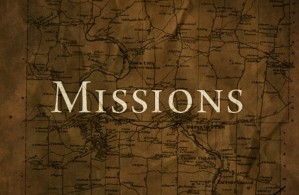 When you think of missions what do you think of? Working to help the “less fortunate” of your community? Providing aid to someone in desperate need, who needs your particular help to make it through the day? Far too often when when we think of missions we think of being help to those people who are over there, casting our self in the role of helper, and the other in the role of helpless.
When you think of missions what do you think of? Working to help the “less fortunate” of your community? Providing aid to someone in desperate need, who needs your particular help to make it through the day? Far too often when when we think of missions we think of being help to those people who are over there, casting our self in the role of helper, and the other in the role of helpless. The goal of Agape Community Transformation (ACT) Uganda is not this top down type of support, but rather stands by their goal of: “Working shoulder-to-shoulder supporting self-development of villagers in Muko Sub-County, Uganda.”
The goal of Agape Community Transformation (ACT) Uganda is not this top down type of support, but rather stands by their goal of: “Working shoulder-to-shoulder supporting self-development of villagers in Muko Sub-County, Uganda.”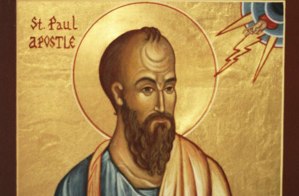 Though he was instrumental in founding that church community, he places credit where it is due, acknowledging that God, not Paul is the one who enables good work among them. Paul is not their savior, but a co-laborer in building the kingdom of God. Paul prays for the people of Philippi with joy because of their “sharing in the gospel.”
Though he was instrumental in founding that church community, he places credit where it is due, acknowledging that God, not Paul is the one who enables good work among them. Paul is not their savior, but a co-laborer in building the kingdom of God. Paul prays for the people of Philippi with joy because of their “sharing in the gospel.” In Greek, this word that we have translated as “sharing in” is “koinonia.” Koinonia has a rich depth of meanings including: partnership, participation, communication, communion, contribution, fellowship. It is in its very essence about mutuality, not being above or below, leading or following, but being shoulder-to-shoulder, ibega ha ibega. This koinania type of relationship is the way we are called to serve in missions, acknowledging one another as brothers and sisters in Christ.
In Greek, this word that we have translated as “sharing in” is “koinonia.” Koinonia has a rich depth of meanings including: partnership, participation, communication, communion, contribution, fellowship. It is in its very essence about mutuality, not being above or below, leading or following, but being shoulder-to-shoulder, ibega ha ibega. This koinania type of relationship is the way we are called to serve in missions, acknowledging one another as brothers and sisters in Christ. Just this past week I read a quote in the PCUSA Mission Yearbook that I think typifies this well. In speaking of mission partnership a volunteer wrote, “We thought you came to give us something. Now we understand that you came to help us see what we already have and use what we have to find solutions to our problems”
Just this past week I read a quote in the PCUSA Mission Yearbook that I think typifies this well. In speaking of mission partnership a volunteer wrote, “We thought you came to give us something. Now we understand that you came to help us see what we already have and use what we have to find solutions to our problems” This is the work that we are called to do, provide what we have to provide, but also fully understand that God is already at work in and among the people we are called to help. By acknowledging the many gifts of our partners in mission and “praying with joy,” as Paul did, we are better able to be full partners in serving God’s kingdom together. May we indeed ever strive to live Ibega ha Ibega with our brothers and sisters in Christ all over the world. Amen.
This is the work that we are called to do, provide what we have to provide, but also fully understand that God is already at work in and among the people we are called to help. By acknowledging the many gifts of our partners in mission and “praying with joy,” as Paul did, we are better able to be full partners in serving God’s kingdom together. May we indeed ever strive to live Ibega ha Ibega with our brothers and sisters in Christ all over the world. Amen.
























